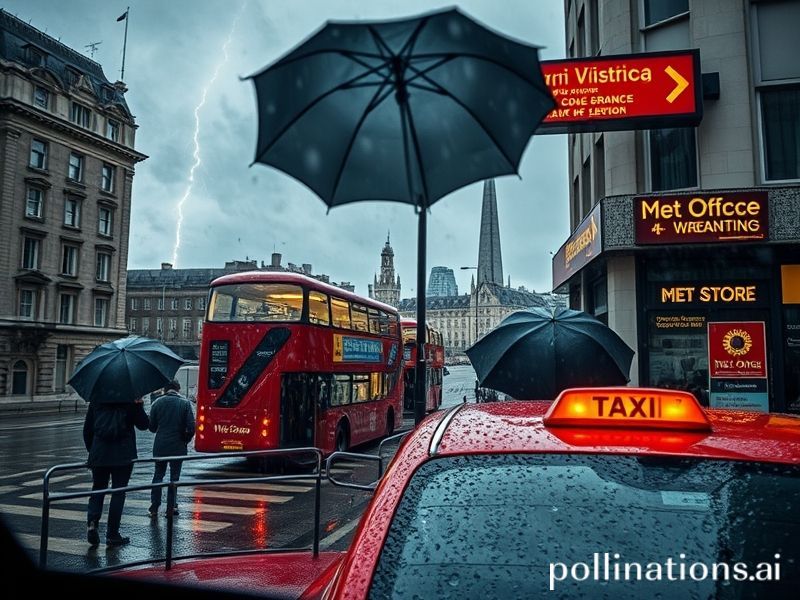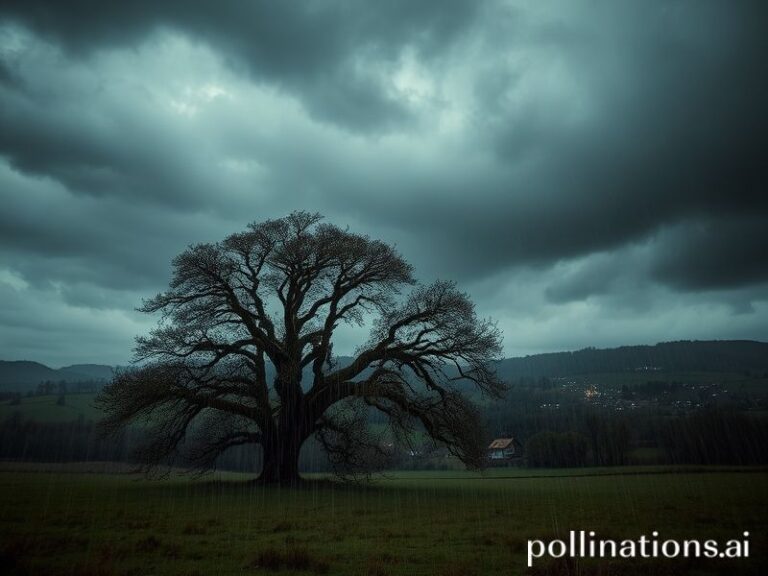UK Thunderstorm Chaos: How British Weather Panic Became the World’s Favorite Climate Comedy
**The Empire Strikes Back… With Weather: UK Thunderstorms Remind World That British Misery Still Exportable**
LONDON—While the rest of the planet grapples with wildfires, floods, and the slow-motion apocalypse of climate change, the United Kingdom has once again proven its mastery of the understated catastrophe. The Met Office’s latest yellow weather warning for thunderstorms and heavy rain has sent Britons scurrying for their anoraks and their sense of proportion, reminding the international community that some forms of imperial decline are more meteorological than geopolitical.
From the perspective of a world increasingly accustomed to climate disasters that resemble biblical plagues, Britain’s seasonal precipitation panic might seem quaint. California watches its forests incinerate, Pakistan recovers from monsoons that submerged one-third of the country, and Australia periodically becomes Mordor. Meanwhile, the nation that once ruled the waves finds itself defeated by a bit of damp weather and some atmospheric percussion.
Yet beneath the surface of this meteorological melodrama lies a tale of global significance. The UK’s weather warnings arrive as Europe experiences its hottest June on record, with temperatures reaching levels that make one question whether the Continent is auditioning for a role as the Sahara’s understudy. The same atmospheric instability sending Britons diving for cover is part of a planetary pattern that has seen Antarctic sea ice shrink to unprecedented levels and Canadian wildfires paint New York’s skies in shades of dystopian orange.
The international implications are as subtle as a London downpour. Britain’s infrastructure, like that of many developed nations, was designed for a climate that no longer exists. Victorian sewer systems meet 21st-century deluges in a marriage as doomed as any royal romance. The resulting chaos—flooded Underground stations, canceled trains, and gridlocked motorways—serves as a cautionary tale for nations still convinced that adaptation is something that happens to other people.
Financial markets, those omniscient barometers of human folly, have already priced in the disruption. Insurance companies across the globe adjust their risk models with each British weather event, their algorithms learning what Londoners have always known: that predicting English weather is like forecasting the mood swings of a particularly temperamental deity. The economic ripple effects reach far beyond these shores, affecting supply chains that stretch from Mumbai to Minneapolis, reminding us that in the interconnected tapestry of global capitalism, even a soggy Tuesday in Tunbridge Wells can disrupt widget production in Wuhan.
The human response follows predictable patterns that transcend national boundaries. Social media erupts with the digital equivalent of tutting, as Britons document their meteorological misfortune with the same stoic humor that saw them through the Blitz, the 2008 financial crisis, and that unfortunate business with the lettuce outlasting a prime minister. Meanwhile, international observers offer sympathy mixed with barely concealed schadenfreude, the global equivalent of watching a former superpower discover that even weather refuses to respect its historical significance.
What makes this meteorological moment globally relevant is its perfect encapsulation of humanity’s response to climate change writ small. The same forces that flood British basements are reshaping weather patterns worldwide, yet the response remains stubbornly local: stock up on tea, complain about the trains, and hope it all blows over by teatime. It’s a reminder that while climate change may be the first truly global problem, human nature remains endearingly provincial.
As the storm clouds gather over this green and pleasant land, the world watches with the fascinated horror of someone observing a slow-motion train wreck, if the train were carrying nothing more dangerous than damp commuters and the wreck involved nothing more dramatic than soggy sandwiches. The UK’s thunderstorm warning serves as a reminder that in an age of existential threats, we remain remarkably skilled at making mountains out of molehills while actual mountains crumble around us.
The storms will pass, as they always do. The real question is whether humanity will emerge from our collective shelter with any greater wisdom, or whether we’ll simply shake our fists at the sky and carry on as before. In the meantime, the world watches Britain battle its latest weather emergency with the same fascination we reserve for all slow-motion disasters: horrified, captivated, and secretly grateful that for once, it’s happening to someone else.







